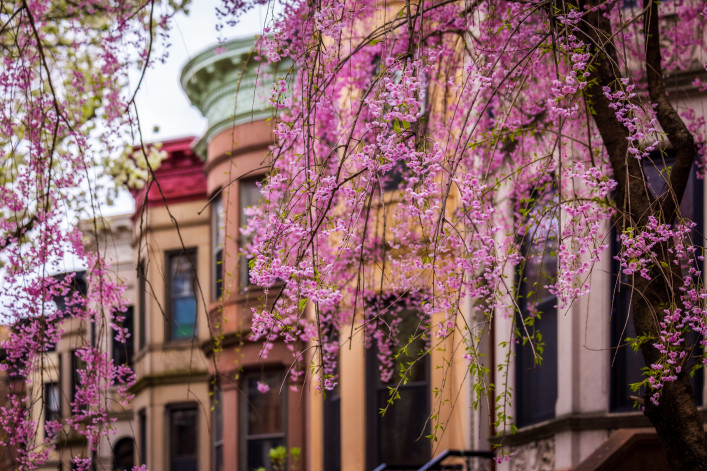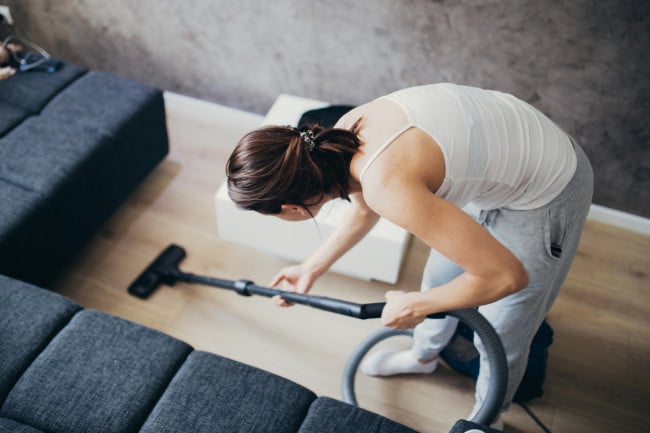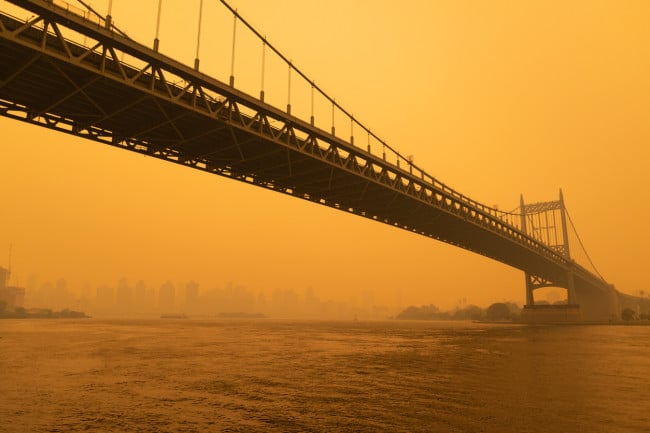5 ways to allergy-proof your NYC apartment
- Keep your windows shut to prevent pollen from getting inside your apartment
- Consider investing in an air purifier and make sure to clean your air conditioner

Close up your windows and ditch your rugs this allergy season.
iStock
Can you get through this sentence without sneezing? Because I sure can’t.
Spring in New York City should be about delighting in the cherry blossoms, not drowning in pollen, snot, and allergy medication. But for many allergy sufferers, this spring has become a stuffy, red-eyed monster. For me, it’s been worse than ever before.
My friend recently banned me from driving her car because I was sneezing so frequently she feared I’d hurtle us off the road mid-achoo. Last week, I sneezed so many times in the library that another patron decided the cursory “bless you” wasn’t enough. He pulled out a massive silver cross and uttered a prayer for me, right then and there. My soul might be saved, but my sinuses sure aren’t.
[Editor’s Note: A previous version of this story was published in July 2018. We are presenting it again with updated information for April 2024.]
Unfortunately, my situation isn’t unique. Roughly one in four U.S. adults experienced seasonal allergies in 2021, and climate change is making seasonal allergies worse, according to the Association of American Medical Colleges. Warmer temperatures encourage plants to produce more pollen for longer periods of time, pushing the spring allergy season up by about 20 days from when it started in the 1990s, The New York Times reported.
But don’t lose hope just yet—there are a few steps you can take to make your NYC apartment an allergy-free zone. Read on for five ways to survive this pollen season.
1. Keep your windows shut
The best way to deal with pollen is to treat it like a bad ex—cut it off. Seal up our windows and doors, but don’t be afraid to run your air conditioner. Your AC unit recycles air from inside your apartment and cools it, so you’re not at risk of pulling in pollen from the outside.
You can also clean or replace your air conditioner’s filter to keep it effectively scrubbing your air. Plus, a clean filter will also lower your AC’s energy consumption and improve airflow, according to the U.S. Department of Energy. (CNET has a good guide on how to clean your window AC unit).
2. Lather, rinse, and repeat
Pollen can also travel inside your apartment on your clothes, hair, and skin, so make sure you’re showering regularly when you return to your apartment. (That’s good general advice, too).
You can also keep your outdoor clothes outside of your bedroom to keep pollen from getting into your sleeping space, according to The New York Times’s guide on dealing with allergies.
3. Do a deep clean
It’s called spring cleaning for a reason. The Mayo Clinic recommends washing your sheets, pillowcases, and blankets once a week in water heated to at least 130 degrees Fahrenheit. You should also wash your curtains, wipe down your blinds, and store or wash smaller items that might collect dust—think teddy bears and squishmallows.
And if you have a fan, wipe down those blades. “Otherwise, they'll chop up and re-circulate any pollen in the air,” said Dr. Clifford Bassett, a practitioner at Schweiger Dermatology Group and the author of “The New Allergy Solution.”
Make sure to wash your rugs if you can—or ditch them altogether. The Mayo Clinic recommends avoiding upholstered furniture. So if you have the appetite (and the budget) to redecorate your apartment, consider leather, wood, metal, or plastic furnishings and vinyl or linoleum flooring.
If you do decide to keep that Persian, vacuum it at least once a week. But beware: Vacuums can spread allergens in your home if not properly cared for, so make sure you empty your vacuum often, change the HEPA filter once every six months at least, according to USA Today.
4. Consider an air filter
A good air filter can help you get through the night, without the mouth-breathing. Make sure you get an air purifier that has a clean air delivery rate that fits the size of your bedroom, and one that uses a HEPA filter. Health has a great list of air purifiers specifically tested for allergies.
Purifiers can be a huge help at combating allergens, smog, and bad smells, if you can afford one. The cheapest air purifier on Insider’s top five picks lists comes in at just under $50, but note that you’ll have to cough up more cash for new filters.
5. Try medication—or non-flowering plants!
You can take over the counter medications to calm your symptoms, and Vox has a good roundup of nasal sprays and other pharmaceuticals.
You could also try a plant that doubles as an air purifier, such as Snake Plants, Spider Plants, Pothos, and Peace Lilies. These species help remove toxins from the air, though they won’t be nearly as effective as an air purifier, Healthline reported. (Architectural Digest has a full list of air-cleaning plants as well).
“They help to scrub the air of chemicals and pollutants,” Bassett said.
A previous version of this story contained reporting by Virginia K. Smith.




























